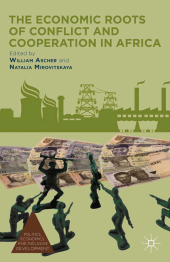 Neuerscheinungen 2013Stand: 2020-01-07 |
Schnellsuche
ISBN/Stichwort/Autor
|
Herderstra▀e 10
10625 Berlin
Tel.: 030 315 714 16
Fax 030 315 714 14
info@buchspektrum.de |

W. Ascher, N. Mirovitskaya
(Beteiligte)
The Economic Roots of Conflict and Cooperation in Africa
Herausgegeben von Ascher, W.; Mirovitskaya, N.
1st ed. 2013. 2013. xiv, 276 S. 8 SW-Abb. 229 mm
Verlag/Jahr: SPRINGER PALGRAVE MACMILLAN; PALGRAVE MACMILLAN US 2013
ISBN: 1-349-47062-7 (1349470627)
Neue ISBN: 978-1-349-47062-4 (9781349470624)
Preis und Lieferzeit: Bitte klicken
This book combines overviews of the nature and causes of inter-group violence in North Africa and sub-Saharan Africa with a collection of country case studies. Both the overview chapter and the case studies trace how economic policy initiatives, and consequent changes in the roles and statuses of various groups, shape conflict or cooperation.
1. Development Strategies and the Evolution of Violence in Africa; William Ascher and Natalia Mirovitskaya 2. Whither Egypt?; Robert Tignor 3. Development Strategies in North Africa; Clement Henry 4. Ethiopia: Averting Violence through its Quest for Growth; Nzinga Broussard 5. The Policy Roots of Ethnic Peace in Tanzania; Michael Lofchie 6. C˘te d┤Ivoire and Ghana Fifty Years after Independence; John McCauley 7. Development Strategies and Conflict in Nigeria; Darren Kew and Chris Kwaja 8. The Absence of Inter-Group Violence in Botswana: An Assessment of the Role of Development Strategies; Amy Poteete 9. Intergroup Peace and Interpersonal Violence in South Africa; Takako Mino 10. Conclusions; William Ascher and Natalia Mirovitskaya
"A large literature on conflict and violence in Africa now exists, but there is very little that examines the linkages between development strategy and practice and violence. This volume is an important addition to current debates about Africa."
- Thomas M. Callaghy, University of Pennsylvania, USA
┤A ┤must-read┤ for development professionals working in Africa, this volume offers a useful and comprehensive framework for identifying the linkages between economic development policies and inter-group relations. Together, the vase studies of 11 countries present a powerful picture of the complex web of factors that contribute to conflict or deter it by way of polices that avoid economic deprivation and social division. The contributors do not shy away from challenges that include land tenure, the role of the state and privatization, and revenue management of extractive industries. I highly recommend this book.┤
- Michael R. Curtis, PhD, Senior Technical Advisor, USAID/Africa Bureau
13
William Ascher, Claremont McKenna College, USA Nzinga Broussard, Ohio State University, USA Darren Kew, McCormack Graduate School of the University of Massachusetts, US Clement Henry, American University in Cairo, Egypt Chris Kwaja, University of Jos, Nigeria Michael Lofchie, University of California, Los Angeles, USA John McCauley, University of Maryland, USA Takako Minom, Claremont Graduate University, USA Natalia Mirovitskaya, Duke Center for International Development, USA Amy Poteete, Concordia University, Canada Robert Tignor, Princeton University, USA


